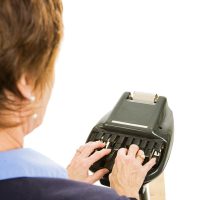Creating a Clear Record in Your Deposition Transcript

Depositions aren’t just another type of interview. Conducting a successful deposition requires certain unique skills that an attorney should keep front of mind throughout the process, all contributing to the clarity and usefulness of the deposition transcript you create. Below, find a list of tips on how to help create a clear deposition transcript, and contact an experienced court reporting service to further ensure that your deposition experience is successful.
- Think about how a response will appear in writing: During the course of a normal conversation, we’re used to people using gestures to communicate a thought or indicate a location, but these gestures are useless in a written deposition transcript. Remember to explain in words what gesture a deponent made for the sake of the record, as well as to describe any other nonverbal communication that might occur during the deposition (i.e., “Let the record reflect that opposing counsel rolled his eyes.”)
- Don’t forget to spell names: No matter how common the name you’re including in a transcript, be sure to spell it for your court reporter. Many names have multiple common spellings, and leaving it up to the court reporter to guess at the right one could result in confusion.
- Provide technical terms and definitions: If your deposition will include numerous obscure technical terms, prepare a list of these terms for your court reporter in advance to ensure that there’s no confusion during the deposition.
- Be patient when listening to a response: Avoid cutting off or talking over a witness. The court reporter can only transcribe audible parts of a conversation, and being in too much of a hurry to ask your next question could result in your question being inaudible over the previous response.
- Speak at a reasonable pace: Your court reporter is trained to transcribe speech at high rates of speed, but there’s a speed at which words become indistinct. Taking a moment to slow down your speech will not only ensure greater accuracy of the record by offering your reporter a moment to double check what has already been transcribed, but will also offer you a moment to consider what line of questioning you wish to pursue next.
- Clearly indicate when you’re reading from another document: If you choose to read from another document during a deposition, be sure to use “quote” and “unquote” as appropriate, and that you clearly indicate the name and exhibit number of the document from which you’re reading.
If you are in search of skilled, professional court reporting services in Maryland, contact the Baltimore offices of Evans Reporting at 800-256-8410.
Schedule Now